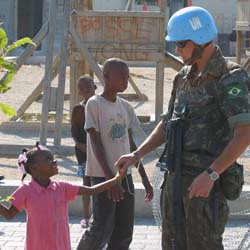Security and Development
 Is development really sustainable without security? It’s the component of development in Haiti that is most often overlooked by the larger international and governmental development agencies. Is a maturing civil society possible when the security situation continues to get worse? The security situation seems to be at a plateau now and could improve or deteriorate. Now is a good time for us to look for answers. Iraq, Afghanistan, and Haiti are interesting comparison studies as we discuss this issue.
Is development really sustainable without security? It’s the component of development in Haiti that is most often overlooked by the larger international and governmental development agencies. Is a maturing civil society possible when the security situation continues to get worse? The security situation seems to be at a plateau now and could improve or deteriorate. Now is a good time for us to look for answers. Iraq, Afghanistan, and Haiti are interesting comparison studies as we discuss this issue.
Iraq is a worse case scenario security situation. Sure, some "humanitarian space" has been created by collaboration between the military and international or non-governmental humanitarian organizations, but clearly this is not a safe environment for any of them. More and more money must be spent on security for even minimal development projects. Both Baghdad and the country side remain dangerous.
Afghanistan seems to be a medium-risk security situation. Enough security exists for their Provincial Reconstruction Teams (PRTs), which consist of military and civilian sector specialists and Afghan counterparts, to achieve visible results with funds intended for the countryside. Kabul's lid is kept from blowing off by a strong military presence, the countryside is more dangerous.
Haiti is a lower risk security risk than both Iraq and Afghanistan. However, developmental agencies have not considered security to be an element of their work in Haiti. 1100 kidnappings have occurred in the past ten months, violence can be either political or criminal in nature. It’s often not easy to tell the difference. Port au Prince is the real security problem. The countryside is much as it ever has been, poorer perhaps as deforestation and erosion continue, but life remains calm. Would a modified PRT approach work?
It may. I am not advocating for the return of the military, talk about an institution that carries a lot of baggage. The Haitian military has killed more of its countrymen than the French ever did. But a hybrid PRT approach could work, given a commitment of 10-15 years. Military and Civilian USG officials would work closely with Haitian on security and development issues at the same time in their designated region of responsibility.
Port is a tough nut to crack though. Is it better to negotiate and compromise with the gang leaders or to go after them? If MINUSTAH sits back, people die. If they go after people in the slums, there will be collateral damage and people will die. It is not an easy situation. But the PRTs could develop a sense of legitimacy that MINUSTAH does not.
Clearly, old approaches are not working and this is a new possibility. I’d be interested in hearing your thoughts on it.
Bryan
Add new comment